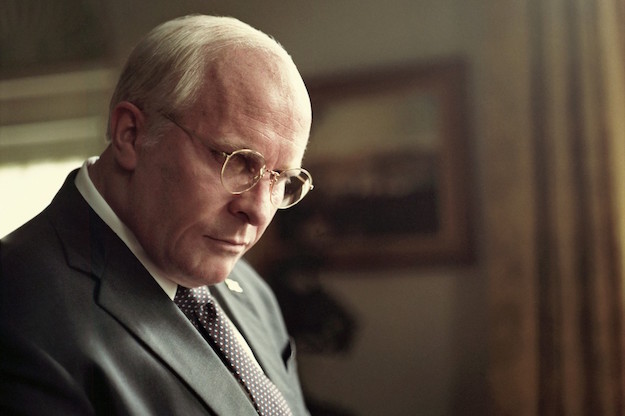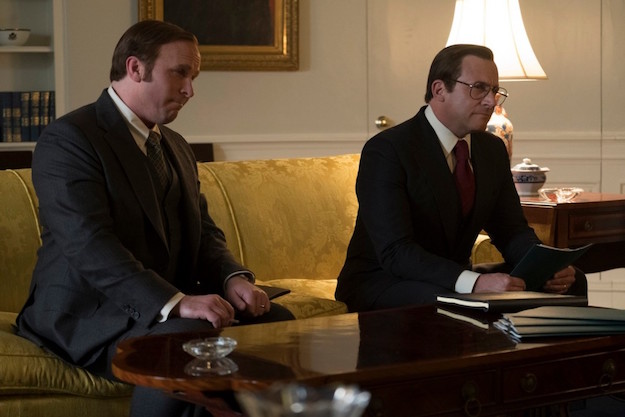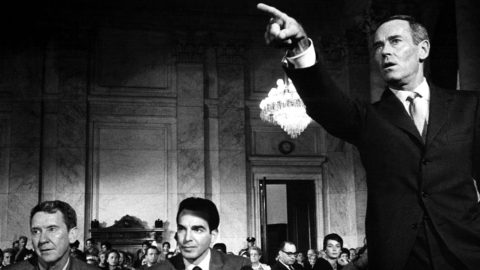Film of the Week: Vice

There are plenty of moments in Adam McKay’s Vice—his depiction of the rise of former Vice President Dick Cheney—that make your blood run cold. And there are several others that just make you grind your teeth. One comes halfway through, when Vice imagines a moment when Cheney might have left politics and quietly retired, leaving the world a much better place. The end credits run, and then abruptly the narrative resumes: we know how things really turned out. The other moment comes at the beginning. A caption points out that the story we’re about to see is true, although given the secrecy for which Cheney was so notorious, it’s hard to be sure of the facts; still, the caption tells us, “we did our fucking best.”
On one hand, it’s this gonzo, what-the-hell-folks tone that makes Vice less sophisticated a satire than it might have been if it had taken itself more seriously—the film sometimes strains to be wryly comical in an SNL sketch fashion. And at moments it succeeds: there’s an enjoyable cameo from Alfred Molina as a restaurant maître d’ offering powerful diners the recently invented spin-flavored dishes of the day: “Enemy Combatant,” “Extraordinary Rendition,” et al.
On the other hand, Vice takes itself very seriously indeed. That seriousness expresses itself sometimes as anger; again, it does so quite effectively. There’s a powerful shot near the start, an apocalyptic State of America image in which a forest fire rages uncontrollably while a golfer calmly swings a club on a manicured green, oblivious to the horror behind him. That seriousness also manifests itself in the acting, which for the most part isn’t cartoonish at all, but rather comes across as realistic and weighty in the extreme. Yes, there’s some levity to Steve Carell’s performance as a snake-like, self-congratulatory Donald Rumsfeld, and it’s no surprise that there’s a broad streak of cartoon goofiness in Sam Rockwell’s turn as a cluelessly affable Dubya.
But the weight in this film, both dramatic and physical, comes from Christian Bale. He’s bulked up and transformed, through Greg Cannom’s prosthetic make-up, into the Cheney of recent years: bald, barrel-shaped, strangely impassive. With his deep, uninflected raspy voice, this Cheney comes across as an embodiment of malignity with neither soul nor affect—and the film perhaps overdoes the visual play on the question of whether he actually had a heart, beyond the strictly physical one.
Like The Big Short, McKay’s virtuoso explication of last decade’s financial crisis, Vice is a sort of lantern lecture—an illustrated account of what happened in Cheney’s career and the meaning of what happened, with voiceover narration and occasional digressive “sidebars” on specific topics. Ideally, given the questions it raises, Vice should deliver a great deal: it sets out to solve the mystery of who Cheney is, how he became so powerful, what and who he represents (i.e. what he signifies, but also which financial and ideological interests he has protected and promoted). The last question Vice answers fairly well, informatively if sometimes bluntly: the film’s real meaning could almost be boiled down to the caption, towards the end, which tells us that Halliburton stock rose by 500 percent after Cheney, the company’s former CEO, presided over war in the Middle East.
As for explaining how this nebulous shadow of a man attained such power, the film achieves a certain amount, but not altogether satisfactorily. The insights into Cheney’s inner being, such as it is, begin when we see him as a young man in Wyoming in 1963, fazed and bloated at the wheel when his car is stopped by a cop. The pivotal moment in Cheney’s youth—and Vice is somewhat heavy-handed in flagging up its pivotal moments—comes when his girlfriend and later wife Lynne Vincent (Amy Adams) gives him a no-nonsense ultimatum to stop being a “big fat piss-soaked zee-ro” and get his act together. Against all odds, he does, and we next see Cheney five years later as a glum, sobered man on the Washington Congressional Internship Program, starting his work for Rumsfeld. This, we can see, is where a certain horrific narrative in modern history begins, but we can’t yet see who Dick really is, still less imagine how he turned himself round.
The film pitches itself as a series of questions and insights. Another pivotal moment comes on 9/11, when Cheney is hustled into the Operations Center safe room. Why, the film later asks, did he have his lawyer in the room with him? The answer to that comes right at the film’s start: we hear that “fear, confusion and uncertainty” ruled the room, while Cheney “saw something no one else did… He saw an opportunity.”
Essentially, Vice is a horror story about what it means when individuals, economic interest groups, corporations, ideological factions—anyone who knows how to milk a crisis—see the world, politics, and history in terms of opportunity. Behind the inscrutable scowl forever fixed on Cheney’s face is a man adept at figuring things out. One of those things is the meaning and implication of the Unitary Executive Theory, which accounts for the remit and the extent of presidential power. It comes to Cheney as White House Chief of Staff under Gerald Ford; as he sees it, the Theory means that the president (or anyone under his ostensible command, who may appropriate presidential power for themselves) has carte blanche to do just about anything, and quash all opposition. It is, the film’s voiceover puts it, “the power of kings, pharaohs, dictators,” and could essentially make Cheney into Galactus, Marvel Comics’ devourer of planets (cue a presumably rather expensive illustration). Cheney doesn’t get to be Galactus yet, because just then Jimmy Carter comes into power—but it’s clear what the glittering prize is.

“Beware the quiet man,” we’re warned at the start of the film, which proposes to tell us about a man who changed millions of lives “and did it like a ghost.” Vice works as a fairly informative illustration of Cheney’s strengths, weaknesses, and awful achievements. The weaknesses are treated almost with indulgence: when we see him, in one of his career lulls, campaigning in his native Wyoming, we almost pity him, he’s so ineffectual as a speaker. His wife proves infinitely more charismatic, taking over for him while he’s ill. As the power behind his throne, Amy Adams is quite terrifying here, in a variation on the part she played so chillingly in The Master. The idea that Lynne might have played a sort of Lady Macbeth role is brought to the fore brilliantly in a scene in which the couple discuss his opportunity to become Vice President. It’s understood that we don’t know exactly what might have been said—as the narration puts, “We can’t snap into a Shakespearean soliloquy.” But the couple go Bardic anyway, and their bedroom conversation in blank verse—“I say to you now…”—is an intensely clever scene.
There is something to be said for a heightened approach to political portraiture, foregrounding the idea that political figures are doomed to act out caricatures of their public image. Think of Robert Altman’s Secret Honor, or of Paolo Sorrentino’s Il Divo, about Italian Prime Minister Giulio Andreotti—a film that took political satire into the realms of the downright operatic. These films, however, had an advantage: people may not have known exactly what their subjects did in particular circumstances, but they knew their overall legend very well, and the films could rely on that general familiarity as a baseline. McKay’s problem is that much of what Cheney did was done under cover of bureaucratic darkness. No one really knows who that dreary old bald guy was and what he did, so the film sets out to tell us—that’s the premise anyway.
Vice does tell us about Cheney’s deeds, and in some detail, but at the risk of identifying him as the single source (rather than the representative, and indeed the symptom) of so many modern evils. Yes, Cheney represents the powers that contributed to economic and environmental catastrophe, to the rise of ideological warfare under the guise of news coverage, to the acceptance of torture and other evils (under new PR-contrived euphemisms), but he and the other guys down the corridor weren’t the only causes. Depicting him as a demon king prevents the film from getting too entangled with wider questions about a corrupt, complex system; it runs the risk of showing contemporary America as primarily the result of a few shady sweetheart deals (in scenes such as Cheney’s meeting with a cadre of facially redacted company CEOs). That’s far too reductive—and perhaps inevitable, when you make this kind of film, but it’s a serious drawback.
At least Vice reminds us that the effect of politics is not abstract: at one point it shows a White House discussion about the possible bombing of Cambodia, then cuts to villagers there, unaware of what’s about to hit them as a direct result. This may not be Eisenstein in terms of politically illuminating montage, but at least it’s a salutary move to take us away from the vacuum-sealed corridors of power for a moment. However, the question of political decisions and their real effects is handled more awkwardly when we discover exactly how the film’s intermittent Everyman narrator (Jesse Plemons) is, as he puts it, “related” to Cheney: an ingenious but too flashy rhetorical ploy.
As a film about politics, Vice astutely keeps its options open—it imparts the key information, it asks the key questions, and it keeps us entertained through the potentially boring parts, sometimes by shifting gear between biopic earnestness and flipness, sometimes by spelling things out diagram-like (one rather patronizing moment in the film shows various Bush Jr. administration players identified by pieces in a board game). What Vice doesn’t do, for the most part, is give Cheney a voice or a real presence until the very end, when Cheney turns to camera with cold eyes and a harsh, dead voice, and addresses us directly and defiantly: “I can feel your recriminations and your judgment, and I’m fine with that.” Until then, Bale’s performance—fine as it is insofar as it has weight, accuracy and a deathly sort of gravitas—nevertheless seems to be skulking deep beneath the layers of latex. This is the point of the film, perhaps, but it’s nevertheless frustrating. We never really know who, or what, is present under those liver-spotted temples, behind the ruthless, mirthless exterior of this Darth Vader of blandness.
Jonathan Romney is a contributing editor to Film Comment and writes its Film of the Week column. He is a member of the London Film Critics Circle.





